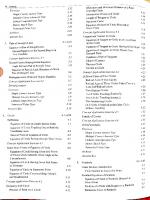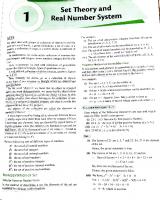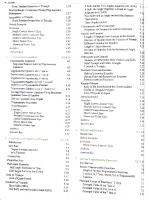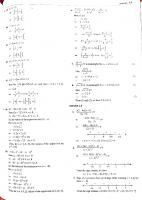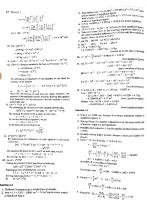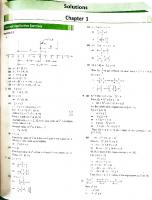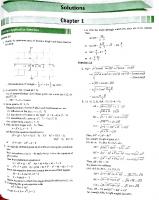Magnetism and Electromagnetic Induction for JEE (Advanced), 3rd edition 9353503728, 9789353503727
6,101 1,333 185MB
English Pages [312] Year 2019
Recommend Papers
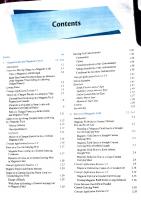
- Author / Uploaded
- B. M. Sharma
File loading please wait...
Citation preview
Contents
1.29 Moving Coil Galvanometer
1.30
vii
Preface 1.
Construction
and Magnetic Magnetic Field
1.1-1.64
Forces
Introduction
in a Magnetic Field Force on a Moving Charge Units of Magnetic Field Strength
Theory of the Current Sensitivity
Galvanometer
1.30
1.1
of the Voltage Sensitivity
Galvanometer
1.30
1.1
1.2
Conditions
for Determining the Direction Right Hand Rules of the Magnetic Force Acting
on a
1.2
1.1
Concept Application Exercise Field Motion of a Charged Particle in a Magnetic Field Charged Particle Entering into Magnetic Region from Outside
If Particle is
Projected at Some Angle with
Magnetic Field (Helical Paths) Path of a Charged Particle in Both Electric and Magnetic Fields
Applications Involving Charged
Particles
Galvanonmeter
Exercise
1.4
Single Correct
1.5
Answer
Type
1.5
Type Multiple Correct Linked Comprehension Type
1.6
Matrix Match Type Numerical Value Type
Answers
Archives Answers Key
1.9 1.11
Moving
2.
Magnetic Field Due to Current Element:
Velocity Selector
1.12
Biot and Savart Law
Magnetic Field
1.49 1.52 1.57 1.58 60
2.1
Introduction
2.1
1.12
Direction of Magnetic Field Due to a Straight
1.14
Current Carrying Wire a
1.15
Field Due to Carrying Wire Field Due to
a
Magnetic
Motion of a Charged Particle in Non-Uniform
1.41
2.1-2.61
Sources of Magnetic Field
1.12
Cyclotron
1.31
1.63
in a Magnetic Field
Mass Spectrometer
1.30
1.32 1.41
Exercises
1.3
Lorentz Force
for Sensitive
Concept Application Solved Examples
Moving
Charged Particle
1.30
2.2 Straight Current
2.3
Straight Current
Concept Application Exercise 1.2
1.16
Magnetic
Force on a Current-Carrying Wire
1.17
Carrying Wire of Intinite Length
1.17
Straight Wire
2.4
1.18
Magnetic Induction Due to a Large Current Carrying Sheet
2.8
Magnetic Field Due to a Semi-lnfinite
Magnetic Force Acting on a Current Carrying
Conductor Direction of Force on a Current-Carrying Wire in Magnetic Field Concept Application Exercise 1.3
1.23
Magnetic Dipole and Dipole Moment
1.24
Torque on a Current-Carrying Planar Loop in a
2.3
Concept Application Exercise 2.1 Magnetic Field at the Center of a Cireular Coil Concept Application Exercise 2.2
2.9 2.10 2.14
1.26
Magnetic Field of a Circular Current Loop
2.15
Energy of Dipole
1.28
Finding Magnetic Field Inside a Long Solenoid
2.16
Work Done in Rotating a Current-Carrying Coil in Magnetic Field
1.29
Uniform Magnetic Field
Force Between Two Infinite Parallel
Current-Carrying Wires
2.18
Concept Application Exercise 2.3
2.20
iv Contents
Exercise 3.2
2.21
Ampere's Law
Ampere's Law Guidelines for Applying Wire Induction Due to a Cylindrical
Magnetic
Magnetic
Hollow Induction Due to a
Due to
a
Large and Thick
Current Carrying Sheet
Magnetic
Intensity of Magnetization
2.25
2.28 2.39 2.39
Single Correct Answer Type Multiple Correct Answers Type
2.49
Linked Comprehension Tipe
2.51
Matrix Match Type Numerical alue Type
2.54 2.56 2.57
Archives Answers Key
2.60
3. Permanent Magnets and Magnetic 3.1-3.32
Properties of Matter Introduction
3.1
Bar Magnet
3.1
Properties of Bar Magnet
3.1
Strength of Bar Magnet
3.2
Magnetic Field Magnetic Field Lines Coulomb's Law of Force Between Two Magnetic Poles A Small Current-Carrying Coil as a as a
Magnetic Dipole Bar
Magnet
Magnet Magnetic Field at Any Point Due to a Short
Magnetic Dipole Torque on a Bar Magnet in a Magnetic Field Potential Energy of a Bar Magnet Placed in a Magnetic Field
Concept Application Exercise 3.1 Earth's Magnetism
Magnetic Elements of the Earth of a Bar
Find
Tangent Law
3.17
Magnetic Permeability (4)
3.17
Magnetic Flux
3.17 3.17
4.
Paramagnetic Substances
3.17 3.18
Ferromagnetic Substances
3.18
Paramagnetism on Basis of Electron Theory
3.19
Ferromagnetism Hysteresis
3.19 3.20
Salient Features of Hysteresis Loop
3.20
Soft and Hard Magnetic Materials
3.20
Concept Application Exercise 3.3
3.22
Solved Examples
3.22
Exercises
3.27
Single Correct Answer Type Archives Answers Key
3.27 3.32 3.32
Electromagnetic Induction
4.14.66
3.2
4.1
Magnetic Flux
4.1
3.2
3.3
Magnetic Field on Equatorial Line of a Bar
to
Magnetic Susceptibility (Xm)
Introduction
3.3
Neutral Point and
3.16
3.2
Magnetic
Magnetic Field on Axial Line of a
3.16
Diamagnetic Substances
2.2
Exercises
Atom
3.16
Classification of Magnetic Materials
Exercise 2.4
Dipole
3.16
Total Magnetic Field or Induction
2.27
Toroid Magnetic Field of a
3.15
Magnetic Intensity
2.26
Field of a Solenoid
Concept Application Solved Examples
2.23
2.24
Cylindrical Wire
Magnetic Induction
2.22
Concept Application Materials Magnetic Properties of
3.4
3.5
Flux Linkage Work Done i
4.2
Changing Orientation of a Current
Carrying Coil in Magnetic Field Faraday's Law of Electromagnetic Induction Direction of Induced EMF Induced Charge Lenz's Law
Concept Application Exercise 4.1 3.6 3.7
Motional Electromotive Force
Finding Direction of Induced EMF Special Cases
3.7 3.9
3.9 3.10
Magnetic Moment 3.11
Tangent Galvanometer
3.12
Deflection Magnetometer Vibration Magnetometer
3.13 3.13 3.14
Motional EMF
4.4 4.5 4.6
4.8 4.8
4.13 4.14
4.15 4.15
as an
Motional EMF
in a in Magnetic Field
Equivalent Battery
Random
Shaped Wire Moving
Concept Application Exercise 4.2 EMF Across Rotating Straight Conductor Motional EMF when the Magnetic Field is Non-Uniform Concept Application Exercise 4.3
Induced Electric Field Induced EMF in a
4.16
Stationary Conductor
4.16
4.22 4.23 4.26
4.26 4.27 4.27
Contents V 4.28
Time-Varying Magnetic Field
4.29
Forces Electric Field Lines of
Concept Application Sohved Examples
4.32
Exercise 4.4
4.33
4.40
Exercises
4.40
Single Correct Answer 7ype Multiple Correct Answers Tpe Linked Comprehension Tipe
4.51 4.54 1.59
Matrix Match Tipe Numerical Value Type
4.62 4.64
Archives Answers Kev
4.66 5.1-5.47
5.
Inductance
or
AC Circuits
Only Inductor Only Circuits Containing
Resistor AC Circuits Containing
AC
5.1 5.1
Self-Inductance
5.1
EMF Direction of the Self-Induced
5.2
Inductance of a Solenoid
5.3
Mutual Inductance to
a
5.5
Pair of Coils
Two Calculation of Mutual Inductance Between
Capacitor AC Circuits Containing
Only
Resistor, Inductor, and AC Circuit Containing in Series (Series LCR Circuit)
Capacitor
LCR Circuits Power in Series of Current
Wattless Component
in Series LCR Circuit of Resonance 0-Factor (or Quality Factor)
Another Definition of Q-Factor
Skin Effect
Concept Application
Exercise
6.1
Solved Examples
Linked Comprehension Type
Series Combination
5.6
Parallel Combination
5.7
Matrix Match Type Numerical Valhue Type
5.8
Analogy Between Self-Induction Concept Application Exercise 5.2
and Inertia
5.10 5.10
Concept Application Exercise 5.4
6.10 6.10
7. Electromagnetic Waves
6.13 6.13
6.19 19
6.23
6.24 6.26 6.27 6.27
6.29 7.1-7.9
Maxwell's Equations
1.2
Electromagnetic Wave Spectrum
Energy Density
7.3 7.3
5.19
Intensity
1.3
5.22
Momentum
1.3
Properties of Electromagnetic Waves
7.3
Atmosphere Troposphere
7.4
Stratosphere
7.4
Mesosphere lonosphere
7.4
Solved Examples
7.5 7.7
5.15 5.17
5.18
Solved Examples
5.22
Exercises Single Correct Answer Type
S.29
29
Multiple Correct Answers Type Linked Comprehension Type
5.3 .38
Matrix Match Type
5.43
Numerical Value Type Archives
5.44
Answers Key
5.47
6. Alternating Current
6.9
Maxwell's Displacement Current
5.12
Oscillation of Electrical and Magnetic Energy
6.9
7.1
Decay of Current
Oscillations in an LC Circuit
6.5 6.8
7.1
5.11
Inductor
6.4
Introduction
Growth of Current
Concept Application Exercise 5.3 Energy Stored in the Magnetic Field of an
Archives Answers Key
5.11
Growth and Decay of Current
6.4
6.12
Combination of Inductors
Inductor in Electrical Circuits
6.4
6.11 Transformers
5.6
5.1 Concept Application Exercise
6.3 6.3
6.9
Choke Coil
5.6
Coils from Their Self-Inductance
6.2 6.3
Capacitive Reactance
Exercises Single Correct Answer Type Multiple Correct Answers Type
5.5
6.1
Inductive Reactance
Resonance
Introduction
Total Flux Linked
Current Average Value of Value of Current Root Mean Square (RMS)
Mean
5.45
6.1-6.29
Introduction
6.1
Phasor Diagrams
6.1
Exercises Single Correct Answer Type
1.4
7.4
7.7
Archives
7.9
Answers Key
7.9
vi
Contents
Solutions
S.1-S.114
Chapter 1
S.1
Chapter 2
S.27
Chapter 3
S.50
Chapter 4
S.58
Chapter 5 Chapter 6 Chapter 7
S.84S.103 S.I13
Appendix:
Chapterwise Solved January 2019 JEE Main Questions (All Sets)
A.1-A
7
Electromagnetic Waves
NTRODUCTION in 1865, Maxwell discovered ght together the
the
phenomenon
displacement
of
electricity
current. This
and
magnetism Coherent and unified theory. After this discovery, Maxwell
MAXWELL'S DISPLACEMENT CURRENT According to Ampere's circuital law, the magnetic field B is related to steady current I as
dicted the transmission of energy by electromagnetic waves,
B dl
shich could travel with the speed of light. This led him to mnclude that the light itself is an electromagnetic wave. According to
him,
an
accelerated
sinusoidal time-vary1ng magnetic field,
charge
which in
produces turn
a
produces
asinusoidal time-vary1ng electric field. The two fields so
roduced are mutually perpendicular time-varying electric and magnetic fields. They constitute electromagnetic waves which an propagate through empty space. The velocity of electromagnetic waves in free space is given
..(i)
where I is the current path C.
travelling
the surface bounded
by closed
In 1864, Maxwell showed that relation (i) is logically inconsistent. He accounted for this inconsistency as follows:
Consider
a
parallel plate capacitor
having plates P and Q being charged with battery B. During charging, a current I flows through the connecting wires which changes with time. This current will
c=
produce magnetic field around the can be detected using a magnetic compass needle. Consider two loops c, and c, parallel to the plates P and Q of the
wires which
wdere 4 =1.257x 10-6TmA-) and E, (=8.854 x10-12 CNm2) TE, Tespectively, the absolute permeability and the absolute pemittivity of free space. The velocity of electromagnetic waves
u ree
space
(vacuum)
is
1e,3 x 10 m s.
equal to
the
velocity of light in vacuum,
capacitor. C is enclosing only the connecting wire attached to the plate P of the capacitor and c, lies in the region between the two plates of capacitor. For the loop c,, a curent I is flowing through it, hence Ampere's circuital law for loop c, gives
B
LLUSTRATION 7 1
d
(11)
C
What physical quantity is the same for X-rays of wavelength Um, red light of wavelength 6800 Å, and radiowaves of
wavelength 500 m?
Since the
loop c,
lies in the region between the plates of the curTent flows in this region. Hence Ampere's circuital law for loop c, gives
capacitor,
no
B-di 0
Speed is the physical quantity which is the same in
vacur
um for given X-ray, red light and radiowave.
O f speed of electromagnetic waves in vacuum is
C3x103 m s.
ii)
C The relations (i) and (iii) continue to be true even if two loops c, and c, are infinitesimally close to the plate P of the capacitor. On the other hand, as the loopsc, and c, are infinitesimally close. it is expected that
LLUSTRATION 7.2 Pdne electromagnetic wave travels in vacuum along electric CtIon. What can you say about the directions of its and 30
Mgnetic
field vectors? If the frequency of the
Hz, what is its
re are in
he
the xy
wave is
wavelength
electric field
vector
E
plane.
USing c= v, we get
C
V
and
and
magnetic
3x10 1=
30x60
field vector B
C
(iv)
C
Thus, relation (iv) is in contradiction with relations (ii) and
(il). This led Maxwell to point out that Ampere' s circuital law given by (i) is logically inconsistent.
Idea of Displacement Current: Maxwell predicted that not e conductor produces magnetic fiela Only a current flowing in a also a time-varying electric field (1.e., changing electric in a vacuum/free space (or in a dielectric) produces a
electric field)
=10 m
as
magnetic field.
7.2
Magnetism and Electromagnetic Induction
It means a changing electric field gives rise to a current which flows through a region so long as the electric field is changing there. Maxwell also predicted that this current produces the same
magnetic field
as a conduction current can
produce.
This current
=
The Lorentz equation is
is known as 'displacement current".
F=q(xixB
Thus, displacement current is that current which comes into play in the region in which the electric field and hence the electric
E, = Ez) sin (of-ky)
flux is changing with time.
B,
Maxwell defined this displacement current in space where electric field is changing with time as (V)
where o is the electric flux. Maxwell
also
found
that
conduction
current
()
and
displacement current (,) together have the property ofcontinuity
d+4
4hequation: d i 4
-ky), where
Bxy sin (
=
and k Since = 2f, where fis the frequency the wavelength.
=
2tn, where 1is
Therefore, 2T= 27/ fa But f gives the velocity of the
wave.
Hence fA
=
c
=
k.
Hence,
the velocity of the waves is given by 1
although, individually, they may not be continuous. This idea led Maxwell to modify Ampere's circuital law in
C
order to make the same logically consistent. He states Ampere
LLuSTRATIDN 7.4
circuital law to the form,
Suppose that the electric field amplitude of an electromagnetic
B-dl =(0+1p) =%I+ ddt
wave is E
Determine
(a)
It is now called as Ampere Maxwell law.
1 2 0 N/C and that its frequency is v = 50.0 MHz
B.
,
k,
and A.
(b)
Find
expressions
for E
and B.
ILLUSTRATION 7.3
Sol
The following figure shows capacitor made of two circular
plates.
The
capacitor
is
being charged by
an
external
(a)
(i)
E.n
Using-
Bmax
source
which supply constant current equal to 0.15 A. Obtain
displacement charged by
a
constant curent across
plates.
= C, we get
Dmax
Given
=187x10 Vs
E
120
C
3x103
= 40x10T
1.e., Bay = 400 nTT max
dt
ii) =2av= 2x Tx 50 x 10 3.14x 108 rad s
Sol Displacement current 4 But
= EA = A
=
=
iv)
9_% dadq, E di
Here I= 0.15 A
(ii) k = -272x3.14 =1.05 rad s
doc
=
(b)
E
3x10
= S0x 105
n
=Emax Sin(kr - or)j
120sin(1.05x -3.14 x 10* x)j
dt
I=0.15 A
c = Av or A =
B
Bmax sin(kx - ør)k =
400
sin(1.05r-3.14 x
10 x r)k
MAXWELL'S EQUATIONS
TLLUSTRATION 7.5
The four Maxwell's equations and Lorentz force law together constitute the foundations of classical electromagnetism. The
Suppose that the electric field part of a electromagnetic wav
Maxwell's equations are:
in vacuum is
E (3.1 NC) cos (1.8 rad/m)y + (5.4x 10 rad/s) =
1"equation:
-
4S
=
'equation: ã - dÑ = 0
3dequation:
(a) What is the direction of propagation? (b) What is the wavelength A? (c) What is the frequency v? (d) What is the amplitude of the magnetic field part wave?
of me
write an expression for the magnetic field part ofthe wavc
Electromagnetic Waves
3. lcos {1.8y + (5.4 x Here E 50 with standard equation mparing it cos(kr + wr)d =
7.3
10°)r}i
Comp
E =Ep
(a)
density
is
equal
to the
magnetic density
in average,
27 =3.5 m
Using &=weget A= 5.4x10°
v =-: ic) Frequency, )
Thus, the electric energy
d i r e c t i o n
OT,
= 0.86 MHz
27T
4 Ho
c = o r B-E=_31
C
3x1o810nT
B
e) B=
10
INTENSITTY cos(1.8y +5.4 x 10$)
The energy
crossing
per unit
area
per unit time
perpendicular to
the direction of propagation is called the intensity of a wave.
FLECTROMAGNETICWAVE SPECTRUMM
CAt
Rrudly. the various regions of the electromagnetic wave gctrum may be assigned the wavelength ranges as follows:
10-2 10
10-15
106
10-3
100 103
in
10 -
-
meres y-Rays
UVIR
----
Consider a cylindrical volume with area of cross section A and length c Ar along the x-axis. The energy contained in this cylinder crosses the area A in time At as the wave propagates at speed c. The energy contained is
Radio waves
Heat radiations
X-Rays
Power
Microwaves
Wa aves
U=
(c Ar)A
U The intensity is I=AAt
ENERGY DENSITY The electric and magnetic fields in a plane electromagnetic wave
given by E Eg sin ø(t-xlc) ad B= B, sin @(1 xlc)
= UC in terms of maximum electric
ficld,I=eo Ee
=
MOMENTUM
-
The electromagnetic wave also caries linear momentum with it. The linear momentum carried by the portion of wave having
any snall volume dV, the energy of the electric field is
energy Uis given by p = Ulc.
d the energy ofthe magnetic field is Up = B
Thus, if the wave incident on a material surface is completely absorbed, it delivers energy U and momentum p =Ulc to the surface. If the wave is totally retlected, the momentum delivered is 2Ulc because the momentum of the wave changes tromp to -p. It follows that electromagnetie waves incident on a surface
dV
24 Itis, the total energy is U =e, E2 dV 24
Iheenergy density 1s
u
to
24Z
dV
exert a force on the surface.
PROPERTIES OF ELECTROMAGNETIC
B
WAVES (a) In electromagnetie waves the electrie tield vector Ë.
E sin? ot - xlc)+B sin aot- xle)
magnetic field vector B and propagation vector k are
2Ho
wettake the ave verage
Verage value of 1/2
over a
long
mutually perpendicular such that E, B, and k torm a right
time, the sin' terms have
an
angle system. Hence electromagnetie waves are transverse (b)
in nature. Electromagnetice waves travel with speed of light. In vacuum
their speed is
Now,
oCB
and HoE%
=so that,
Ho
and
Eoc
7.4
Magnetism and Electromagnetic Induction
aB
In isotropic medium, their speed is
ox Electromagnctic
(h)
cxert pressure
momentum
carry surfaces, which
waves
(P) on
is
hence
and
known
as
can
radiation
wave with Poynting vector an clectromagnetiC pressurc. For absorbing surface. S, incident upon a perfectly
where n = u , E, is the refractive index of the medium,
P= C
=relative permeability of medium, and relative permittivity of medium or electric dielectric
and if incident upon
E=
direction of (c) The Poynting vector S E x H represents the energy fiow per unit area per second along the direction of
C
=
wave propagation. Its unit is Wm2. The medium offers hindrance to the propagation of wave. value Such a hindrance is called Wave Impedance (Z) and its in a medium is given by
The electric and
)
E
a
sinusoidal plane
the positive x-direction
B B , sin (kx-ot)
and relative
For vacuum or free space
propagating
in
E sin (kx - or)
angular wave given by
permeability
fields of
can also be written as
(.. = 4 , Ho and &: Eg E, ) and e, are relative where , permittivity of the medium.
magnetic
wave
electromagnetic
angular frequency
where @is the
Z=
perfectly reflecting surface, then
25
constant.
(d)
a
=
of the
wave
27f
and k
=
is
intensity ofa sinusoidal plane electromagnetic vector taken over defined as the average value of Polynting wave
The
)
376.6
one cycle.
VEo Also in free space
ATMOSPHERE atmosphere of earth extends upon about below. composition of atmosphere is as given
The
B H
and k is the
number or propagation constant which are
o VE
300 km. The
TROPOSPHERE B
This layer extends up to a height of about 12 km. etc. Density consists of water droplets, vapour, dust particles of air decreases as we move from bottom to top of this layer
Hofo
Troposphere
E= Bc (e) In free space The electrostatic energy density is equal to magnetostatie
energy density. Average electric energy density =Average magnetic
affecting our environment. energy
density
STRATOSPHERE This layer extends from about 10 km to about 50 km. In the uppet or of ozone. The density we have a the
layer atmosphere, part of air at the top of the stratosphere is about 10 times he density d
4o Total average energy density = e E
Cin free space)
(f) In a medium
Magnetic energy density Total energy density
The
=
B 244
B =eE" + 2
The electric and magnetic fields satisfy the following wave equations, which can be obtained from Maxwell's third and fourth equations.
0E
the surface of earth.
MESOSPHERE
Electric energy density =
(g)
This layer is responsible for all the weather phenomena
mesosphere extends from about 50
kn. km to about 80
loNOSPHERE
Th:s
The atmosphere above the mesosphere is called ionospc
rest
layer is composed partly of electrons and positive 1ons: 1 of the atmosphere is composed mostly of neutral molecules The atmosphere is transparent to visible radiation an
We
most
can see the sun and the stars through it clearly. Howevc hy
is absorbed event
able to pass through, it also preve Low lying clouds in the mosphere
infrared radiation is
not
as
the atmosphere. infrared radiation from passing through. The ozone ly the passage of ultraviolet radiation from the sun.
locks
Electromagnetic Waves
LUSTRATION 7, 7.6
the power S ViSibleradiation. Wha
of
sadhation Ata
)
distance distance
is the average
ofl m from
intensity of visible
XAMPLE 7.1
of 10 m?
power
=
of radiation at 1 Average intensity
5
Power
0.4 W
=
5
2
EXAMPLE 7.2
m
According
= 0.004 W m
Sol. (3)
are
electromagnetic cm
famous
some
numbers
em
in physics.
According to the
EM
theory, the vibration magnetic field
Maxwell's EM
electric and
each belongs. spectrum of which emitted
by
atomic
EXAMPLE 7.3
f+elds electric and magnetising wave, the electromagnetic In maximum energy flow is and 0.265 Am. The are 100 Vm an
hydrogen
in
arising from two close b) 1057 MHz (frequency ofradiation as Lamb shift) known energy levels in hydrogen, radiation associated with the isotropic
) 2.7 K (temperature the "big-bang' to be a relic of filling all space-thought origin of the universe) lines of sodium) d) 5890 Å-58963 Å (double nucleus transitionn'Fe (energy ofa particular e)
14.4 keV
255OCiated with
a
famous
high
resolution spectroscopic
method of sodium)
Wavelength is of the
Frequency is of the
order of 102 m,
order of 10-2
radio
wave.
short radio
wave.
i.e., short
Hz, i.e,.
0.29 0 . 0 9 cm=0.0009
i.e., order of 10 wavelength is of the i.e., order of 10m,
ofthe
hc
hc
Energy =or e
Energy Xe
=
W
= 100 x.265 = 26.5
m EXAMPLE 7 . 4 emitted by hydrogen in interstellar The 21 cm radio wave the interaction called the hypertine interaction space is due to of the emitted wave is nearly is atomic hydrogen. the energy
x3x10*
14.4x10 x1.6x10-19
1.e., A= 0.86 x 10-0 8.6 x 10-
m
(2) 1 joule
(1) 10-7joule
4) 10 joule
(3) 7x 10 joule
="=O.6 X10*x
3x10S
=
0.94 x 102= 10-24 J
21x10
EXAMPLE 7 . 5 microwave.
visible
radiations.
The oscillating electric and magnetic
vectors
of an
electromagnetic wave are oriented along
(1) The same direction but differ in phase by 9o° (2) The same direction and are in phase (3)
a= 6.63x10-
A/m.
E, 100 V/m, B,=0.265 Sol (1) Here Maximum rate of energy flow S =E, x B,
m
m,
avelengths are
(2) 36.5 W/m (4) 765 W/m
(1) 26.5 W/m2 (3) 46.7 W/m
Sol.(4)E
(c) T=0.29 or
ie., X-rays.
(4) pressure radiant
associated with
contexts
interstellar space)
d)
(2) electric current
field give rise to magnetic field
(wavelength
0.29
electric field
propagation contains of electric direction. Thus the changing perpendicular in mutually
radiation in different
State the part of the
changing
a
waves
LLUSTRATION 7 . 7
Given below
to Maxwell's hypothesis,
(1) an e.m.f. (3) magnetic field
at 10 m
4xTx10
4Tr
3x10
gives riseto
radiation Average intensity of Power
C
m
4xTx1
4Tr
=6x10*T
B==
Sol (2) c=
5 W
a)Visible
4
(4) 11 1 0 - T
(3) 9x 10 T
ellechon.
(a) 21
(2) 6x 10-*T
(1) 4x 10-T
Assumet h a t
b)
with to oscillate oscil|lating
the electric field was found of the an amplitude of 18 V/m. The magnitude magnetic field will be In an apparatus,
the bulb?
the radiation is emitted isotropicailly and neglect
At a
Solved Examples
of a 100 W ligh bulb is converted
About
7.5
Mutually perpendicular directions and are
in
phase
(4) Mutually perpendicular directions and differ in phase by 90°
w
(3) Ë and B are mutually phase i.e. they become zero and are place and at the same time.
perpendicular to and
each other
minimum at the same
7.6 Magnetism
and
Electromagnetic Induction The
EXAMPLE 7.6 In which
one of the following regions of the electromagnetic to spectrum will the vibrational motion of molecules give rise
absorption
EXAMPLE
(2) microwaves
by
(4) radio waves
region of EM-spectrum. Due
Kirchhoff's
to
-
wave
law
(3) E,B,
Sol Bo
EXAMPLE 7 . 7 or
electromagnetic wave travels along z-axis. Which would the following pairs of space and time varying fields An
generate such a wave
wave travelling8 Sol. (1) E, and B, would generate a plane EM in z-direction. E, B and k form a right handed system k is along
z-axis. As ixj=k Ck i.e. E is
along x-axis and B is along y-axis.
signal
by point
from a certain point in the form of surface of the
an antenna
emitted
received at another
(4) None of these
by
receiving
the
antenna
EXAMPLE 7 . 9 The electromagnetic waves do not transport
(2) charge
EM
SolL (2)
=-
and =27tv
7.13
HV
(1)
2x5x10-16
E
at a distance place.
(1) enerEy
217t
also k
8.85
= 0.61x10 Im
(4) both (1) and (2)
antenna and received
transmitting
Whichdescriofbedthe
can be
both are amplitude Sol (4) Ground wave and sky wave modulated signal is transmitted modulated wave and the amplitude a
).
-
antenna that is 2 m long is oriented at A radio receiver wave and receives a siona the direction of the electromagnetic The maximum ínstantane W/m. x 1010 of intensity 5 ends of the antenma is two the across potential difference V 1.23 (4) 12.3 mv 1.23 (2) 1.23 mV (3)
(2) ground wave
(1) sky wave (3) sea wave
by
vaculum
Sol. (1)I=;%CE%
EXAMPLE 7.8 A
sin(kx
These relation gives E R = B,a0
EXAMPLE
(1) E, B, (2) E, B, (3) E, B, 4) E, B
B,
(2) E,= B,k
ak
Eo=C.
=
=
(1) Ek=B,o
in
spectroscopy the same will be absorbed.
E i xB,j
gOing through
); B
is true following equation
(2) Molecular spectra due to vibrational motionlie in the
microwave
C
7. 1 2
sin(kx
E E
= constant
VIT
An electromagnetic
(1) ultraviolet (3) infrared Sol.
-
ratio&= 27 27v
(3)
transport
waves
(4) information
momentum
momentum
energy,
and
information but not charge. EM waves are uncharged
Also
Eo
o
=
E,d = 0.61 x 10 x 2=123 pV
EXAMPLE 7 . 1 4 which has relave Electromagnetic waves travel in a medium 2.14. Then thesped permeability 1.3 and relative permittivity will be medium the in wave of the electromagnetic x m/s 10 (1) 13.6x 10 m/s (2) 1.8 x (3) 3.6x 10 m/s (4) 1.8 10 m/s
Sol.4) v= uE
3x10
V1.3x2.14
= 1.8 x 10 m/s
EXAMPLE 7 . 1 0 A
plane electromagnetic wave
If the
wave
p 0 , E= 0
Sol.
(2)
pressure
on
a
delivers momentum p and energy
(1) p=0, E =0 (3)
is incident on
EM
E, then
EXAMPLE 7 5 speed of electromagnetic waves in
(2) p 0 , E 0
Ifc is the
(4) p=0, E+0
in a medium
of dielectric
constant
carry
They
momentum and hence can exert
also transfer energy to the surface so
(2) v=cyu,K
(1) v=
K
(3) v=-
EXAMPLE 7.11
An electromagnetic wave, going through sin(lr or). Which of the following is
vacuum
by E E
independent
wave
The angular
length.
(4) kw
(3) k/o
(2)
C
K
is described
of wavelength
Sol. (3)
zabihiy
K and relative pernca
P:0 and E +0.
1)k
speed
vacuum, 1s
, is
waves
surfaces.
material surface.
4)
C and
Sol, (3) Speed of light of vacuum
c=
medium V=-
VHE wave
number k
is The angular frequency
=
a=
27v.
where A is the
C
VHofo
in another
CXercISes
n g l eC o r r e c t
13. A plane electromagnetic wave
Answer Type
E= 100 cos(6 x 10*1 + 4x) V/m
v of sunlight (in W/m) at the solar surface will be I. The
S.6 x
()
4.2 x
() .
10 10
of the
(2) 5.6 x 10 (4) 4.2x 107
(3) 2.4
following has zero average value in a plane
Which electromagnetic wave?
(2) Magnetic potential (4) Magnetic energy (3) Electric energy impedance of free space is The wave (1) Electric field
The frequency
105/ MHz of radiation
levels in close energy
( ) radio waves
hydrogen belongs (2) infrared waves
associated with , The wave
6.
from two
to
(3) micro waves
(2) micro waves
(3) ultraviolet ways
(4) infrared waves
its
(4) wavelength
7. The shortest wavelength of X-rays remitted from an X-ray
e,
8. A-rays are not used for radar purposes, because they are not
(1) reflected by target 2) partly absorbed by target
and p, represent the permittivity and
permeability
medium, the refractive index of the medium
of
is
(2) (4)Eo
Ve field oscillates
plane electromagnetic wave, the electric and amplitude sinusoidally at a frequency of 2.5 x 100 Hz field 480 V/m. The amplitude of the oscillating magnetic a
1.52
x
10* Wb/m?
capacitance
(1)2x 109 Hz
10-l6 J. Its (2) 5 x 10* Hz
(3) 5x 107 Hz
(4) 5x 10i6 Hz
frequency
is
(4) hcleV
10-7 Wb/m
pf
(2) 1.5 T (4) 0.15 T
sinusoidal plane wave
E 36 sin (1.20 x 10':- 3.6 x 10") V/m The average intensity of beam in W/m* will be (2) 3.44 (1) 6.88 (3) 1.72
will be
(3) eVlch
10-7 Wb/m
x
x
=
l0. In X-ray tube, the accelerating potential applied at the anode Is V volt. The minimum wavelength of the emitted X-ray (2) hleV
1.6
18. A flood light is covered with a fitter that transmits red light. The electric field of the emerging beam is represented by a
(4) completely absorbed by target
1)eVih
1.52
tion current of 0.15 A is (3) 15T
.Theenergy of X-rays photon is 3.3x
(2) (4)
17. The magnetic field between the plates of radius 12 cm separated by a distance of 4 mm of a parallel plate capacitor of 100 along the axis of plates having conduc(1) zero
(3) electromagnetic waves
(4) 0.86
19. The average energy-density of electromagnetic wave given by E= (50 N/C) sin(( - kr) will be nearly
I h e area of television telecast is made twice, the height of antenna will be changed as
gnetic (1) 36.6 m (3) 42.3 m
of a
(4) Ko
(3) 1.6 x 10-6 Wb/m
the tube
(3) current in the tube (4) nature of target of the tube
x
the dielectric constant
(2)
(3)
(1)
(1) nature of the gas in the tube
quency 8.2
K,
will be
tube depends upon
(1) halved 3) quardupled 12. If aa Source is source
and
vacuum and e and u represent the permittivity and perme
16. In
(2) intensity
2) voltage applied to
1
(1) Foo E
The percentage power of X-ray increases with the increases
(1) velocity 3) frequency
permeability
medium, its refractive index is given by
ability of given by
(4) rays 2.7 K belongs to
(1) radio waves
be the
4,
15. If
arising
(2) 2.0 (4) 4.0
(3) HKo
(4) 3776 2
B) 1883 2
14. If
(1)
(2) 376.6 Q
(1) 0 2
propagates in a medium of dielectric constant () 1.5
(2) doubled
(1) 10* J/m'
(2) 10 J/m
(3) 10 J/m
(4) 10 J/m
20. A larger parallel plate capacitor, whose plates have an area
(4) kept unchanged
of I m are separated from each other by I mm. If the plates
transmitting electromagnetic wave of lre-
has dielectric constant 10, then the displacement current at this instant is
of the clectro-
106 Hz, then the wavelength transmitted from the source will be
waves
(2) 40.5 m (4) 50.9 m
(1) 25 uA
(2) 11 uA
(3) 2.2 uA
(4) 1.1 MAA
7.8
Magnetism
21. A
and
Electromagnetic Induction
parallel plate capacitor with plate area A and
between the plates d, is charged by a constant separationi. current Consider a plane surface of area A/2 to the plates parallel and drawm simultaneously between the The (1) i
displace
plates.
ment current through this area is
(2) i/2 (4) i/8
(3) i/4
23. The average value of electric energy
density
in
magnetic wave is (E, is peak value)
an
electro
roof willbe
25. In Q. 24, the radiation foree on the (1) 8.53 x 105 N (2) 2.3x 10-3 N (3) 1.33 x 10*N 4) 5.33 x 10 N
of
wavelength 5900 A emitted by any atom or molecule must have some finite total length which is known as coherence length. For sodium light, this length is 2.4 cm. The number of oscillations in this length will be
(2) 4.068 x 10
point
2)r 3
4
(3)
2r kes a
(2) 1.33 x 10-1' N (4) 6.6 x 10-10 N
time is E = (80i +32j-64k) V/m and the magnetic field is
B (0.2i +0.08j-0.29k)uT. The pointing vector for these fields is
(1) -11.52i +28.8j (3) 28.8i-11.52j
(2) -28.8i+11.52i
4) 11.52i-28.8
tion has wavelength of 60 mm. The electric field is in the y-direction and its maximum magnitude is 33 V/m. The equation for the electric field as function ofx and t is (1) 11 sin {t- xlc) (2) 33 sin Tx 10"(t-xlc) (3) 33 sin r(t- xlc) (4) 11 sin Tx 10"(t-xc) 34. In an electromagnetic wave, the electric field oscillated
sinusoidally with amplitude 45 Vm', the rms value of oscil-
lating magnetic field will be (1) 1.6 x 10- T
(2) 16 x 10° T
(3) 144x 10-T
4) 11.3x 10-T
35. The magnetic field in the plane electromagnetic wave s
B=2x 107 sin(0.5 x 10x + 1.5x 10 1)tesla.
a
The
expression for electric field
will be (1) E = 30V2 sin(0.5 x 10 x+1.5x10") V/m
(2) E
.
60 sin(0.5 x 10x + 1.5 x 10"1) V/m
(4) 3.3 x 10-13 T
transmitting antenna of a radio-station is mounted verAt a
tically.
(1)
given by
(4) 4.068 x 10
maximum electric field intensity of 104 Vm' on arrival at a receiving antenna. The maximum magnetic fux density of such a wave is (1) zero (2) 3 x 10* T
29. The
B
field in the ring is
33. A plane electromagnetic wave propagating in the zdirec-
26. A plane electromagnetic wave of wave intensity 6 W/m2 strikes a small mirror of area 39 cm?, held perpendicular to the approaching wave. The momentum transferred in kg ms by the wave to the mirror each second will be (1) 1.2x 10-10 (2) 2.4x 10 (3) 3.6 x 10-* (4) 4.8 x 10-7
(3) 5.8x 10 T
ri
32. In a region of free space the electric field at some instant of
earth's surface. The total power that is incident on a roof of dimensions 8 mx 20 m will be (2) 6.4 x 105 W (1) 2.56 x 10 W 3) 4.0 x 10' W (4) 1.6x 10 W
radiowave has
with time
according to the equation a constant andi is the time. is K where Ki, The ectric changes
(1) 6.6 x 10- N (3) 1.33x 10-10 N
24. The sun delivers 103 W/m2 of electromagnetic fiux to the
28. A
homogeneous the
approaching wave. The radiation force on the mirror will he
4)E
(1) 4.068 x 10 (3) 4.068 x 10
radius r 1s placed in a 30. A circular ring of magnetic field perpendicular to the plane of
small mirror of area 20 cm', held perpendicular to the
2E
wave
(4) 3x 10T
(3) 10 T
31. A plane em wave of wave intensity of 10 W/m?
(2)
27. The
(1)
The field B
22. The sum delivers 10* W/m2 of electromagnetic flux to the earth's surface. The total power that is incident on a roof of dimensions (10x 10)) m will be (1) 10* W (2) 10' W (3) 10 W (4) 10' W
3) EE
peak electric field is 10 V/m. The amplitude ofthe r e radiated magnetic field is (2) 3.33x 10-12 T 3.33 x 10-10 T
10 km due north of the
transmitter the
(3) E, =30/2 sin(0.5 x 10 x+0.5x 10*1) V/m (4) E,
60 sin(0.5 x 10x + 1.5 x 10"/) V/m
Electromagnetic Waves
7.9
Archives 4.
Correct Answer Type
(1)
has the electric and are which always perpendicular to feld E and B, of polarization is given by X and other The lirection romagnetic
in
wave
at
of wave
propagation
by k.
(AIEEE 2012)
peak
travelling electromagnetic wave The peak value of electric field nl. 20 of value neld in a
(2) 9 V/mn (4) 3 V/m
(3) 12 V/m
List-l (Electromagnetic 3 Match
wave
(JEE Main 2013)
type)
and select the correct
association/application) the the choices given below
(its
option from
E
wave
(JEE Main 2015) The electric fields from air enters a medium.
Eo1*cos
=
E
(i) To treat muscular strain
(B) Radiowaves
ii) For broadcasting
(C) X-rays
(i11) To detect fracture
of
2E-i air
=
Eop cos k(2-cr)
of the following options is
(iv) Absorbed by the ozone layer of the atmosphere
(C) 1) (ii) (ii) (iv)
(B) (i) i) (ii) (i)
(D) (iv) (iv) (i)
in medium
their and frequency v refer to where the wave number k and if E,refer E, values in air. The medium is non-magnetic, and medium respectively. air of to relative permittivities which
bones
(A) (1) (ii) (2) ) (3) iv) 4) i)
(4) 7.75 V/m
lists:
(A) Infrared waves
D) Ultraviolet rays
energy
(JEE Main 2014)
are
List II
List I
magnetic
is half of the
energy
(2) 2.45 V/m
(3) 5.48 V/m
6. An EM
with List-II
zero.
m from the diode is (1) 1.73 V/m
strength is
(1)6V/m
density
a
to the magnetic energy are
Electric energy
in
density. around it. The at 0.1 watt uniformly 5. A red LED emits light distance of l field of the light at a amplitude of the electric
x
,Themagnetic
density is equal
density. (4)
andand k| BxE (2) X'| Ë and || Ë B Ë K B and k||ExB (4) X || and |BxE
Electric energy
waves
densities (2) Both electric and magnetic energy the magnetic of double is (3) Electric energy density
Then
that e
has a
propagation of electromagnetic
density.
vacuum
Ai each
the
medium:
f E MAIN
single
During
E2
correct
(2)=4
2
3) S=2
(4) (JEE Main 2018)
(iii) (JEE Main 2014)
Answers Key EXERCISES ingle Correct Answer Type
1.2) 6.(3)
2.(1) 7.(2)
11.(2) 16.(3) 21.(2)
12. (1) 17. (1) 22. (3)
26.(1)
27.(2)
28. (4)
29. (2)
30. 3)
31.(3)
32.(4)
33. (2)
34.(4)
35.(4)
5.(2) 10.(4)
ARCHIVES
14. (3)
15.(2)
19. (1)
20. (3)
Single Correct Answer Type
3. (3)
4. (1)
8. (1) 13. (2) 18. (3) 23. (4)
9. (3)
24. (4)
25.(4)
JEE Main
.(2) 6.(4)
2.(1)
3. (2)
4. (1)
5.(2)
![JEE Advanced Physics-Magnetic Effects of Current and Electromagnetic Induction [3 ed.]
9789353945442](https://ebin.pub/img/200x200/jee-advanced-physics-magnetic-effects-of-current-and-electromagnetic-induction-3nbsped-9789353945442.jpg)
